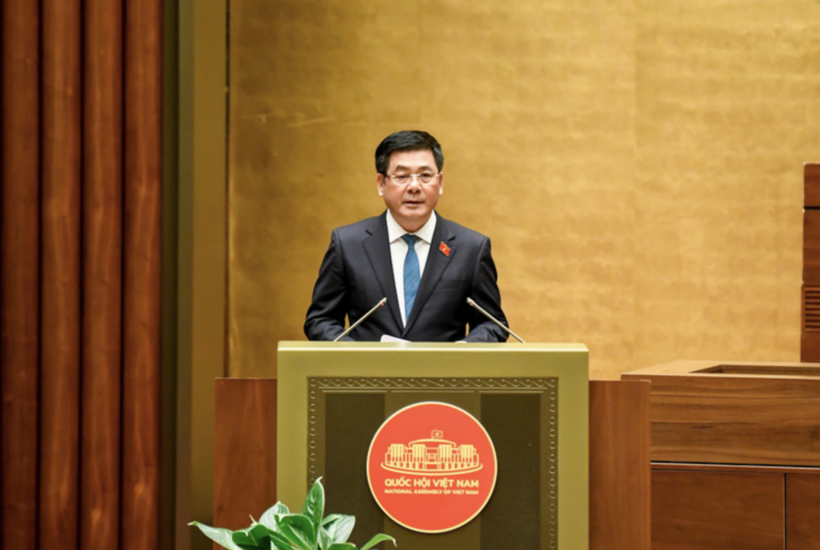
It’s time for Vietnam’s supporting industries to rise through action
19:05 | 23/03/2025 16:18 | 03/11/2025Industry
The draft Law on E-Commerce, submitted to the National Assembly on the morning of November 3, is expected to create a level playing field with greater transparency, protect consumers, and foster the development of the digital economy.
Continuing the working agenda of the 10th Session of the 15th National Assembly, on the morning of November 3, Minister of Industry and Trade (MoIT) Nguyen Hong Dien, authorized by the Government, presented the Submission on the draft Law on E-Commerce.
In line with the Law on the Promulgation of Legal Documents and the National Assembly’s 2025 Legislative Program, the Government issued Submission No.1007 and the accompanying dossier on the draft Law on E-Commerce on October 3.

Minister Nguyen Hong Dien presents the draft Law on E-Commerce to the National Assembly. Photo: NA
The urgent need for a dedicated Law on E-Commerce
Reporting to the National Assembly, Minister Nguyen Hong Dien noted that e-commerce has grown strongly in recent years, at a rate of 20-25% annually, now accounting for around 10% of total retail sales.
However, Vietnam still lacks a standalone law governing this field. Existing regulations are limited to two decrees, Decree No.52/2013 and Decree No.85/2021 amending Decree No.52, which have revealed shortcomings and can no longer address emerging issues in practice, especially with the rise of new, complex business models and entities such as livestream selling, multi-service, multi-platform operations, taxation, consumer protection, and personal data security.
Challenges persist in inspecting and handling counterfeit goods, prohibited items, intellectual property violations, and low-quality products, particularly in identifying sellers, tracing transactions, and enforcing penalties.
Cross-border e-commerce also presents regulatory challenges, including the quality control of imported products, while new mechanisms and policies are needed to support e-commerce infrastructure, encourage stronger participation from the private sector, and promote green and sustainable e-commerce, creating momentum for socio-economic development.
Minister affirmed that the issuance of the Law on E-Commerce is necessary and urgent to fully institutionalize the Party’s new orientations on e-commerce and the digital economy, and to ensure consistency with Vietnam’s international commitments. The law will help resolve existing legal bottlenecks, promote the sustainable growth of e-commerce, protect consumers and domestic production, and contribute positively to national socio-economic development in the new era.
According to the Minister, the drafting of the law has complied strictly with required procedures. The drafting committee held multiple conferences and workshops, collected opinions from ministries, local authorities, National Assembly delegations, experts, scientists, practitioners, affected stakeholders, and the public. These inputs were studied and incorporated into the draft law and related documents, which were approved by the Government and submitted to the National Assembly under Submission No.729 dated August 29, 2025.
The draft law has undergone rigorous review by the Economic and Financial Committee and other bodies of the National Assembly. It has been discussed by the National Assembly Standing Committee and by full-time deputies. Based on the feedback received, the Ministry of Industry and Trade has revised the draft materials and re-submitted them under Submission No.1007 dated October 30, 2025 for consideration and approval at this session.
Ensuring fairness and consumer protection
The draft law consists of 7 chapters and 48 articles, reflecting six key policy directions approved by the Government:
Regulations on types of e-commerce platforms and the responsibilities of participating entities;
Regulations on social networks engaging in e-commerce and multi-service integrated platforms;
Regulations on cross-border e-commerce activities;
Regulations on livestream selling and affiliate marketing;
Regulations on service providers supporting e-commerce;
Policies to promote green and sustainable e-commerce development.
The draft law only governs the rights and obligations of entities using internet platforms for commercial activities. All commercial activities and participants remain subject to relevant sector-specific regulations, as in the physical business environment.
Key new provisions compared with existing legislation include:
First, establishing comprehensive legal definitions for all e-commerce business models, from direct sales to multi-party platforms, and increasing platform responsibility in product recall, consumer protection, and transaction storage for inspection.
Second, expanding the responsibilities of social networks engaged in e-commerce and multi-service platforms, including obligations to prevent abuse of market dominance and ensure fair competition.
Third, introducing seller identification requirements: domestic sellers via VNeID and foreign sellers via legal documentation, ensuring transaction transparency.
Fourth, defining the obligations of livestream sellers and affiliate marketers regarding identity disclosure, information transparency, and consumer protection.
Fifth, requiring foreign platforms to establish or authorize a legal entity in Vietnam capable of fulfilling obligations related to taxation, dispute resolution, and consumer protection.
Sixth, specifying minimum responsibilities for e-commerce support service providers and implementing a rapid response mechanism to suspend cooperation with platforms violating the law.
Seventh, regulating specific contractual elements in electronic contracts with ordering functions, including automated contracts and associated liabilities.
Eighth, adding policies to promote domestic and export-oriented e-commerce markets, with special support for remote areas, vulnerable groups, small businesses, and household enterprises.
Minister Nguyen Hong Dien stated that the draft law sets out 20 administrative procedures in the field of e-commerce. Compared with existing procedures, these have been comprehensively reformed, shifting from pre-inspection to post-inspection based on data and risk management, simplifying processes, and ensuring 100% electronic administration. This approach will ease the burden on businesses and citizens while giving regulatory agencies the tools to monitor, warn, and enforce violations effectively.
Given the urgency of adopting the law, the Government proposes that the National Assembly review and approve the draft in a single-session procedure. Immediately after passage, the Government will assign relevant ministries and agencies to draft and issue implementing regulations to ensure enforcement is synchronized, practical, and aligned with domestic and international contexts, thereby promoting the healthy and sustainable development of e-commerce and the digital economy, in accordance with Resolution No. 57 of the Politburo.

19:05 | 23/03/2025 16:18 | 03/11/2025Industry

19:05 | 23/03/2025 16:11 | 03/11/2025Society

19:05 | 23/03/2025 10:25 | 03/11/2025News and Events

19:05 | 23/03/2025 09:20 | 03/11/2025News and Events

19:05 | 23/03/2025 09:15 | 03/11/2025News and Events